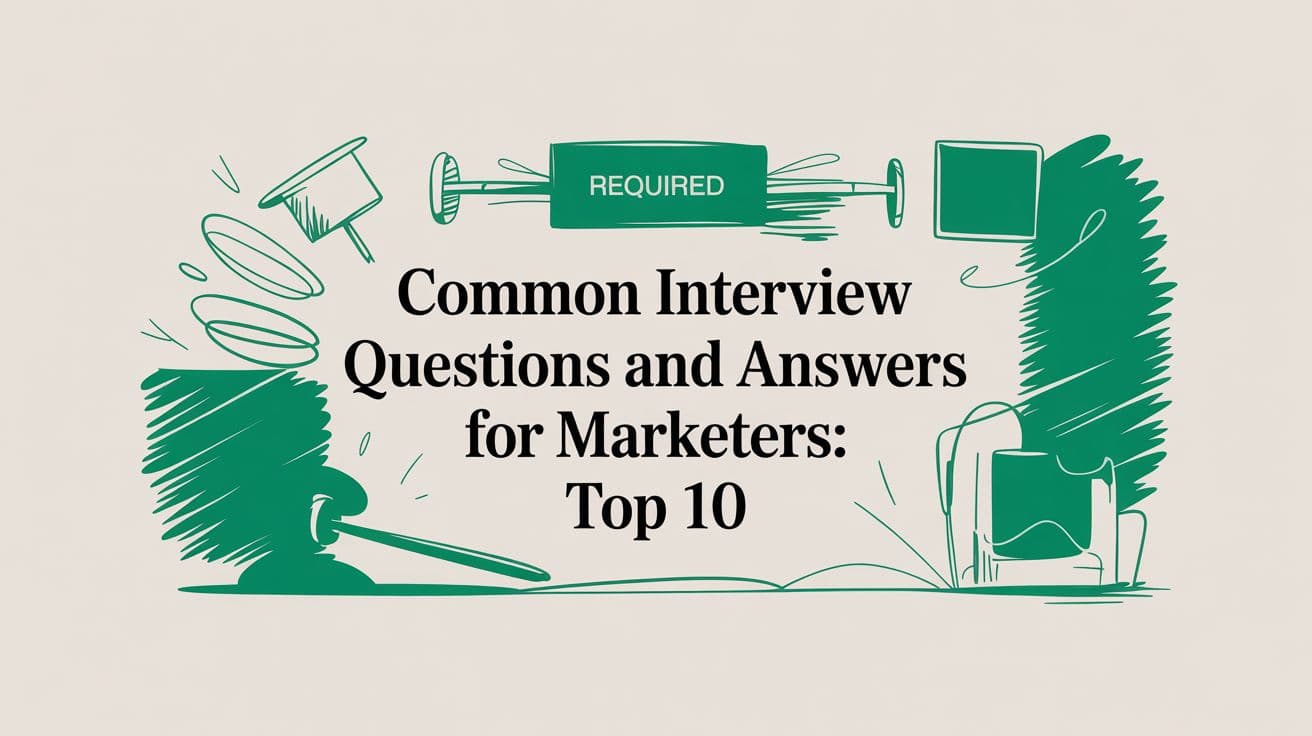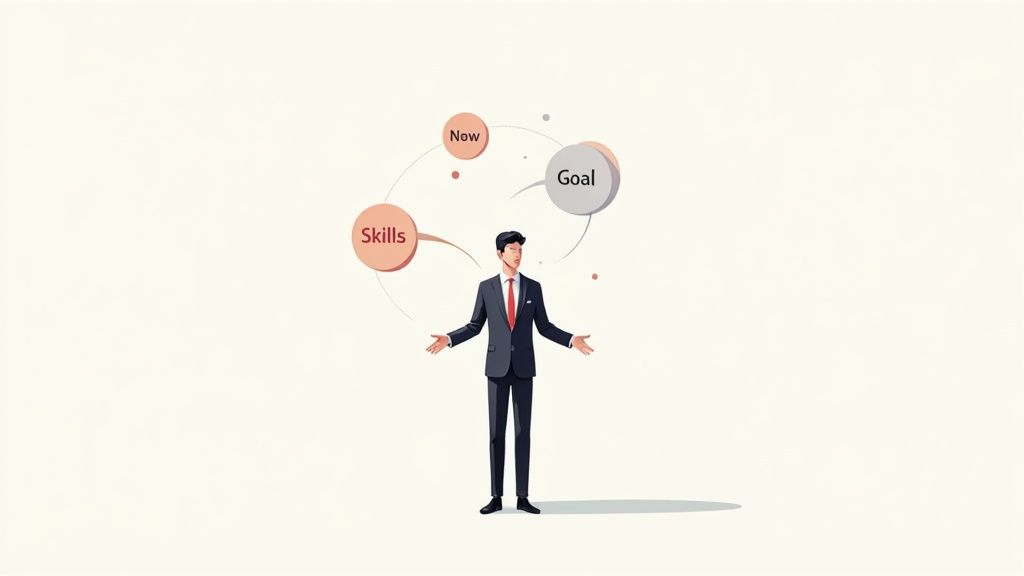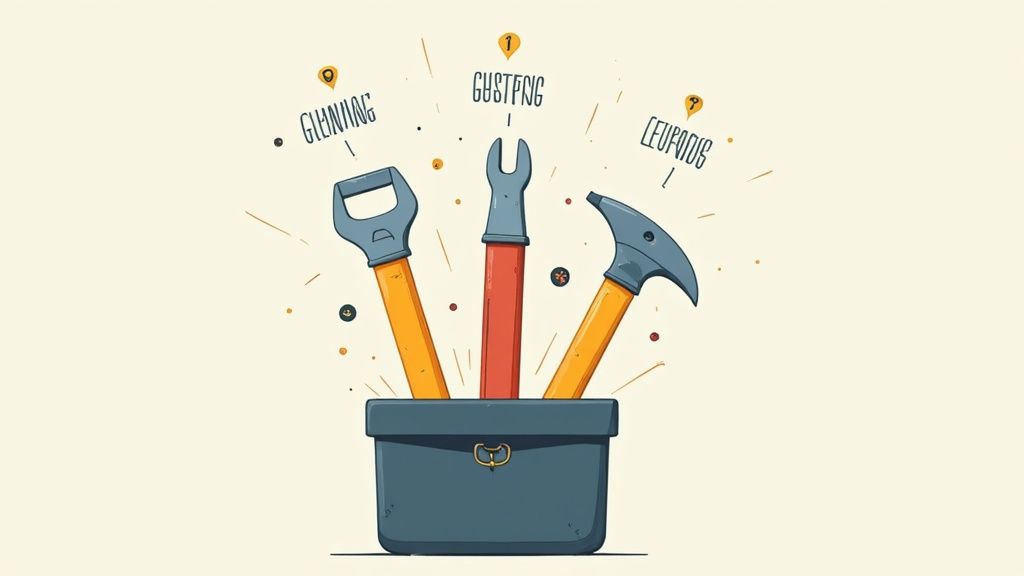Common interview questions and answers for marketers: Top 10

Walking into a job interview can feel like a high-stakes performance, where every line you deliver is scrutinized. But what if you had the script to the most important scenes? This guide is your playbook, meticulously breaking down the 10 most common interview questions and answers you are virtually guaranteed to face, tailored specifically for marketing and communications professionals. We’re moving beyond the tired, generic advice you’ve seen a thousand times.
Instead of vague tips, you'll find a strategic framework for success. This article provides expert-approved answer structures like the STAR method, concrete sample responses for every career stage (from junior associate to senior director), and critical insights into what hiring managers are really listening for. You'll learn not just what to say, but how to frame your unique experience, metrics, and accomplishments to prove you are the solution to their team’s challenges.
We will dissect each question, revealing:
- The "Question Behind the Question": What the interviewer truly wants to know.
- Strategic Answer Templates: Replicable formulas to structure your response.
- Red Flags to Avoid: Common mistakes that can take you out of the running.
- Sample Answers: High-quality examples for paid media, SEO, PR, and communications roles.
Our goal is to transform your interview preparation from a source of anxiety into a well-rehearsed, confident strategy. By mastering the fundamentals, you can focus your energy on what truly matters: connecting with the interviewer and articulating your unique value. Let’s turn that daunting conversation into your next career opportunity.
1. Tell Me About Yourself
This is often the very first question you'll hear in an interview. While it seems like a simple icebreaker, it's a critical test of your communication skills, professional narrative, and ability to connect your background directly to the role at hand. A strong answer sets a positive tone for the entire conversation.

The goal is to deliver a concise, compelling "elevator pitch" about your professional self in under two minutes. Avoid personal stories and focus on a structure that presents your experience as a logical journey leading to this specific interview. This is your first and best chance to frame your candidacy.
How to Structure Your Answer
A proven formula for structuring your response is the Present-Past-Future model. This approach creates a clear, easy-to-follow narrative that highlights your qualifications and ambitions.
- Present: Start with your current role and a significant accomplishment. Mention your title, company, and one key achievement that is relevant to the job you're applying for.
- Past: Briefly explain how you got here. Mention previous relevant experiences that provided you with the foundational skills for your current success and for this next role.
- Future: Connect your past and present to the future. Explain why you are excited about this specific opportunity and how your skills will benefit the company.
Example Answer: Senior Communications Manager
"Currently, I'm a Senior Communications Manager at InnovateTech, where I lead our B2B public relations strategy. Over the last year, I spearheaded a thought leadership campaign that increased our media mentions by 45% and directly contributed to a 15% uplift in qualified marketing leads.
Before this, I worked at Digital Solutions Inc., managing media relations and developing crisis communication protocols, which gave me a strong foundation in managing complex brand reputation challenges.
I'm excited by this opportunity at your company because I'm passionate about leveraging storytelling to drive business growth, and I see a clear opportunity to apply my experience in integrated PR campaigns to help expand your market presence."
2. What Are Your Greatest Strengths?
This question is a direct invitation to sell yourself, but it's also a test of your self-awareness and relevance. Interviewers want to see if you understand the core requirements of the role and can connect your top skills to their specific needs. A strong answer showcases your confidence and proves you are the right fit for the job's challenges.

The goal is to present a few highly relevant strengths, backing each one up with a concrete example or metric. Avoid generic traits like "hard-working" and instead focus on specific skills mentioned in the job description. This shows you've done your research and can articulate your value proposition clearly and concisely.
How to Structure Your Answer
The most effective way to answer is to select two or three key strengths and use the Claim-Example-Tie-in model. This structure ensures your answer is both compelling and directly linked to the role.
- Claim: State your strength clearly and confidently. Choose a skill that is directly mentioned or heavily implied in the job description.
- Example: Provide a brief, specific example that proves your claim. Use a mini-story or a quantifiable result from a previous role to add credibility.
- Tie-in: Explicitly connect your strength back to the company or the specific position you are interviewing for. Explain how this skill will help you succeed and add value.
Example Answer: Digital Marketing Specialist
"One of my greatest strengths is my ability to translate complex data into actionable marketing strategies. For instance, in my previous role at a SaaS startup, I noticed our CPL was increasing. I dug into our Google Analytics and CRM data and discovered our lead quality from paid social was declining despite high volume.
By reallocating that budget toward targeted SEO content and search campaigns, I was able to decrease the overall CPL by 20% within one quarter while increasing MQL-to-customer conversion rates by 15%.
I know this role emphasizes a data-driven approach to optimizing campaign performance, and I'm confident my analytical skills will allow me to identify similar opportunities to improve ROI and drive growth for your team."
3. What Are Your Greatest Weaknesses?
This is one of the most dreaded but common interview questions and answers candidates face. It's a direct test of your self-awareness, honesty, and commitment to professional growth. Interviewers aren't trying to catch you; they want to see if you can be self-critical and proactive about your development.

The goal is to present a genuine, non-critical weakness and then pivot quickly to the specific actions you've taken to improve. Avoid clichés like "I'm a perfectionist" or "I work too hard," as they sound disingenuous. Instead, show that you can identify an area for improvement, take ownership, and make measurable progress.
How to Structure Your Answer
A strong response follows a simple, two-part structure that demonstrates maturity and a growth mindset. This method turns a potential negative into a story of professional development.
- Acknowledge a Real Weakness: Start by stating a genuine, skill-based weakness. Be specific and ensure it's not a core requirement for the job. For instance, a social media manager shouldn't say their weakness is "staying updated on trends."
- Showcase Improvement: Immediately follow up by describing the concrete steps you have taken to address this weakness. Mention training, new habits, or tools you've adopted and share a positive outcome or progress you've made.
Example Answer: Digital Marketing Specialist
"In the past, I sometimes struggled with delegating tasks on team projects, as I had a tendency to want to control every detail to ensure quality. I realized this wasn't scalable and could slow down our team's overall velocity.
To address this, I took a project management course that focused on effective delegation and work-back planning. I began implementing a new system for my team projects, using Asana to assign tasks with clear owners and deadlines, which built trust and empowered my colleagues.
As a result, on our last major campaign, we delivered the project two days ahead of schedule, and the feedback from my team was that they felt more ownership and engagement in the process."
4. Why Do You Want This Job?
This question is a direct probe into your motivation and a critical test of your research. Interviewers use it to separate candidates who want any job from those who want this specific job. A compelling answer demonstrates genuine interest, alignment with the company's mission, and a clear understanding of how you can contribute from day one.
The goal is to show the interviewer you've done your homework and have thoughtfully considered your fit. Your response should blend your professional aspirations with the company's specific needs and culture, proving that your interest is both authentic and strategic. This is your chance to show you are not just qualified, but also truly invested in this opportunity.
How to Structure Your Answer
A powerful way to frame your response is the Alignment-Contribution-Growth model. This structure shows you understand the company, can see yourself making an impact, and view this role as a meaningful career step.
- Alignment: Start by showing you align with the company's mission, values, or recent achievements. Mention something specific you admire, like a recent marketing campaign, a company value that resonates, or its reputation for innovation.
- Contribution: Connect your skills and experience directly to the role's requirements. Explain how your specific abilities (e.g., in performance marketing, SEO, or PR) will help them solve a problem or achieve a goal mentioned in the job description.
- Growth: Conclude by explaining how this role fits into your long-term career goals. This shows you are ambitious and see this position as a mutually beneficial partnership, not just a temporary stop.
Example Answer: Digital Marketing Specialist
"I’ve been following your company’s work in the sustainable tech space for a while, and I was particularly impressed by your recent 'Green Future' campaign. Your commitment to leveraging marketing for positive environmental impact directly aligns with my personal and professional values.
In the job description, you highlighted the need for someone to optimize paid social channels. In my previous role at EcoBrand, I managed a $200k ad budget and increased lead conversion rates by 30% through targeted A/B testing and audience segmentation, a skill set I'm confident would drive similar results here.
I'm excited about this opportunity because it allows me to apply my expertise in performance marketing to a mission I care about, while also growing my skills in a forward-thinking and innovative environment."
5. Why Are You Leaving Your Current Job?
This question tests your professionalism, discretion, and motivation. Interviewers use it to uncover potential red flags, such as negativity, an inability to handle conflict, or a pattern of job-hopping. A great answer frames your departure as a strategic move toward a new opportunity, not an escape from a bad situation.
The goal is to provide a positive, forward-looking, and concise reason for your transition. Avoid complaining about your current employer, manager, or colleagues at all costs. Instead, focus on your desire for growth, new challenges, or a better alignment with your long-term career goals that this new role specifically offers.
How to Structure Your Answer
A strong answer is honest, diplomatic, and focused on the future. Frame your reasoning around professional growth and the unique appeal of the new opportunity.
- Acknowledge Your Current Role Positively: Start by briefly mentioning something you've enjoyed or learned in your current position. This shows appreciation and maturity.
- Explain Your Motivation for Change: Clearly state what you are seeking in your next role. This could be a desire to specialize, take on more leadership, or work in a different industry.
- Connect to the New Opportunity: Conclude by explaining why this specific company and role are the perfect next step to achieve those goals. This demonstrates genuine interest and thoughtful consideration.
Example Answer: Digital Marketing Specialist
"I've genuinely valued my time at Creative Agency Co. and have learned a great deal about managing multi-channel campaigns for a diverse set of clients. It’s given me a fantastic foundation in paid social and SEO.
As I've developed my skills, I've become increasingly passionate about in-house marketing, where I can focus on growing a single brand's long-term strategy and see projects through from conception to deep-level analysis.
This role at your company is especially exciting because it offers the chance to do just that. The opportunity to specialize in the B2B SaaS space and contribute to one brand's growth journey is exactly the kind of focused challenge I'm looking for at this stage of my career."
6. Where Do You See Yourself in 5 Years?
This classic interview question is designed to gauge your career ambitions, long-term goals, and whether your personal trajectory aligns with the company's growth potential. Hiring managers use it to understand if you are looking for a long-term commitment or just a temporary stepping stone, and if you have a realistic plan for your professional development.
Your goal is to show ambition and a clear vision for your future without sounding arrogant or as if you plan to quickly outgrow the role. A great answer demonstrates that you see this position not just as a job, but as an integral part of your long-term career strategy, where you can grow and contribute meaningfully over time.
How to Structure Your Answer
A strong answer should connect your personal ambitions with the opportunities available at the company. Focus on growth, learning, and increasing your level of contribution.
- Acknowledge the Role: Start by reiterating your immediate focus on excelling in the position you are interviewing for. This shows you are grounded and ready to deliver value from day one.
- Discuss Skill Development: Talk about the specific skills and expertise you want to develop. Frame this in the context of becoming a more valuable asset to the company.
- Connect to Company Growth: Align your goals with the company's future. Show that you've done your research and see yourself contributing to their long-term success and taking on more responsibility.
Example Answer: Junior Marketing Analyst
"My immediate goal is to excel in this Junior Marketing Analyst role, mastering your reporting tools and contributing to successful campaigns. Over the next five years, I see myself growing with the company by taking on more complex data analysis projects and developing advanced skills in predictive modeling and data visualization.
I'm particularly excited about your company's focus on expanding into new markets, and I aim to become a subject matter expert who can provide key data insights that support that strategic growth.
Ultimately, I hope to progress into a senior analyst or team lead position where I can not only manage larger projects but also mentor other junior analysts, helping to build a strong, data-driven marketing team here."
7. Describe a Challenge You Overcame
This behavioral question is designed to test your problem-solving skills, resilience, and ability to learn from difficult situations. Interviewers want to see how you navigate adversity and whether you can turn a negative experience into a positive outcome. A strong answer demonstrates not just what you did, but how you think under pressure.

The goal is to present a concise and compelling story that highlights your professional competence and character. By focusing on a relevant professional challenge, you can showcase skills like leadership, communication, and strategic thinking directly related to the role you're seeking. This is a key opportunity to provide concrete evidence of your abilities.
How to Structure Your Answer
The best way to answer this question is by using the STAR method. This framework ensures your story is clear, concise, and impactful, covering all the points the interviewer is listening for.
- Situation: Briefly describe the context. What was the challenge or conflict you were facing? Keep this part short and to the point.
- Task: Explain your specific role or responsibility in that situation. What goal were you trying to achieve?
- Action: Detail the specific, concrete steps you took to address the challenge. Focus on your individual contributions and decision-making process.
- Result: Conclude with the outcome of your actions. Quantify the results whenever possible (e.g., improved retention by 15%, delivered the project on the new timeline) and mention what you learned from the experience.
Example Answer: Digital Marketing Manager
"(Situation) In my previous role, our lead generation from paid social campaigns suddenly dropped by 30% month-over-month, jeopardizing our quarterly sales pipeline goals. (Task) As the Digital Marketing Manager, my task was to diagnose the root cause of the decline and implement a recovery plan within two weeks.
(Action) I immediately initiated a full audit of our ad accounts, creative assets, and audience targeting. I discovered our core audience was experiencing ad fatigue. I then organized a brainstorming session with the creative team to develop three new campaign angles and A/B tested them with small budgets.
(Result) One of the new campaigns dramatically outperformed the others, and after redirecting our budget, we not only recovered the initial 30% drop but ended the quarter 10% above our lead generation target. It taught me the importance of proactively refreshing creative to prevent audience burnout."
8. Tell Me About a Time You Demonstrated Leadership
This behavioral question assesses your ability to influence, motivate, and guide others, whether or not you held a formal leadership title. Interviewers want to see if you can take initiative, make decisions under pressure, and drive a team toward a common goal. Your answer reveals your leadership style, problem-solving skills, and emotional intelligence.
The key is to showcase leadership as an action, not just a position. A powerful response demonstrates how you stepped up to guide a project, resolve a conflict, or champion a new idea, ultimately leading to a positive outcome. This is a prime opportunity to move beyond just listing skills and provide concrete proof of your capabilities.
How to Structure Your Answer
The STAR Method (Situation, Task, Action, Result) is the ideal framework for answering this question. It provides a clear, compelling narrative that is easy for the interviewer to follow and effectively highlights your contributions.
- Situation: Briefly set the scene. Describe the context of the challenge or project. Who was involved? What were the stakes?
- Task: Explain your specific responsibility or the objective. What goal was your team trying to achieve?
- Action: Detail the specific steps you took to lead. Focus on your actions, such as how you delegated tasks, motivated team members, built consensus, or made a critical decision.
- Result: Quantify the outcome. What was the result of your leadership? Mention specific metrics like improved efficiency, successful project completion, or boosted team morale.
Example Answer: Digital Marketing Specialist
"In my previous role as a Digital Marketing Specialist, our team was tasked with launching a major Q4 campaign, but our project manager had to take unexpected leave just two weeks before the go-live date.
My task was to ensure the campaign launched on time and on budget without a formal lead. The team was feeling directionless, and critical deadlines were at risk.
I took the initiative to organize a daily 15-minute stand-up meeting to clarify priorities and track progress. I created a shared dashboard to visualize remaining tasks, assigned ownership based on each person's strengths, and served as the main point of contact for our cross-functional partners, ensuring communication stayed clear and consistent.
As a result of this proactive coordination, not only did we launch the campaign on schedule, but it also exceeded its lead generation target by 18%. The project's success was a huge morale booster, and our department head recognized my initiative in a team-wide announcement."
9. Why Should We Hire You?
This is one of the most direct and common interview questions and answers you'll prepare for. The interviewer is asking you to make a final, compelling case for your candidacy. They want to see if you truly understand the role's requirements, how your skills solve their specific problems, and if you can confidently articulate your unique value proposition.
The goal is to deliver a confident summary that connects your key strengths directly to the job description's most critical needs. This isn't a time for modesty; it's your chance to summarize why you are the best possible fit, combining your skills, experience, and cultural alignment into a powerful closing statement.
How to Structure Your Answer
The best approach is to create a concise, 3-point summary that proves you are the solution to the company's needs. Think of it as your final sales pitch.
- Align with Key Requirements: Start by explicitly mentioning 2-3 of the most important qualifications from the job description and state how your experience directly matches them.
- Showcase Unique Value: Go beyond the job description. Highlight a unique combination of skills, a specific accomplishment, or an experience that makes you stand out from other qualified candidates.
- Demonstrate Enthusiasm & Fit: Conclude by expressing your genuine excitement for the role and the company's mission. Reiterate that you understand their culture and are ready to contribute from day one.
Example Answer: Digital Marketing Specialist
"You should hire me because my background in performance marketing and content strategy is a direct match for the key requirements of this role. With over five years of experience managing multi-channel campaigns, I successfully increased lead conversion rates by 30% in my previous position by optimizing landing pages and ad copy, which I see as a primary goal here.
Beyond my technical skills, I bring a unique combination of data analysis and creative storytelling. I don't just run ads; I analyze the data to understand the customer journey and build narratives that resonate, which will help you not only acquire but also retain customers.
Ultimately, I'm confident I have the skills and proactive mindset to start delivering results quickly, and I am genuinely excited about your company's mission to make financial education more accessible. I am ready to help your team achieve its growth targets."
10. Do You Have Any Questions for Us?
This is almost always the final question of an interview, but it's far from a simple formality. It's a crucial opportunity for you to demonstrate your engagement, critical thinking, and genuine interest in the role beyond the surface level. Your questions reveal how deeply you've researched the company and how seriously you're evaluating this opportunity as a mutual fit.
The goal is to move beyond generic inquiries and ask insightful questions that show you've been listening and are already thinking like a member of the team. This final interaction can leave a lasting positive impression, reinforcing your candidacy and demonstrating that you are a proactive, strategic professional.
How to Structure Your Questions
Prepare 3-5 thoughtful questions in advance, categorized to cover different aspects of the role and company. This ensures you have relevant things to ask even if some topics are covered during the interview. Focus on questions that probe deeper into the role, team, and company strategy.
- Role & Expectations: Ask about the immediate priorities and challenges. What does success look like in the first 30, 60, or 90 days? This shows you are results-oriented.
- Team & Culture: Inquire about the team's structure, collaboration style, or communication dynamics. Asking about the interviewer's own experience can also provide valuable cultural insights.
- Company & Strategy: Pose questions about the company's future direction, upcoming projects, or how this role contributes to broader business objectives. This shows you're a strategic thinker.
Example Questions to Ask
For a Marketing Manager Role:
"You mentioned the goal is to increase market share in the EMEA region. What are the biggest challenges the team is currently facing in achieving that, and what would be my immediate priority in helping to overcome them?"
"Could you describe the typical collaboration process between the performance marketing team and the content team on a major campaign launch?"
"Looking ahead six months, what is the one key metric that will define success for the person in this role?"
10 Common Interview Questions: Answer Comparison
| Question | 🔄 Complexity | ⚡ Resources | 📊 Expected outcomes | 💡 Ideal use cases | ⭐ Key advantages |
|---|---|---|---|---|---|
| Tell Me About Yourself | Low — open-ended, needs basic structure | Minimal — resume review + practice | Quick snapshot of fit and communication | Opening/initial screening | High — breaks ice; candidate controls narrative |
| What Are Your Greatest Strengths? | Low — select relevant strengths & examples | Low — pick 3–4 strengths, prepare examples | Shows competency alignment and confidence | Skill validation; role-match evaluation | High — highlights core competencies |
| What Are Your Greatest Weaknesses? | Medium — requires nuanced, honest framing | Low — identify real weakness + improvement steps | Reveals self-awareness and growth mindset | Assess humility and development potential | Medium — uncovers maturity when authentic |
| Why Do You Want This Job? | Medium — needs company-specific tailoring | Moderate — company research + tailored reasons | Demonstrates motivation and cultural fit | Gauge genuine interest and retention likelihood | High — differentiates committed candidates |
| Why Are You Leaving Your Current Job? | Medium — requires diplomatic wording | Low — reflection + concise phrasing | Indicates professionalism; flags risks | Evaluate judgment, stability, and intent | Medium — exposes mindset and career goals |
| Where Do You See Yourself in 5 Years? | Medium — balance realism with ambition | Low — career planning + alignment prep | Shows ambition, career planning, retention likelihood | Assess long-term fit and growth alignment | Medium — signals growth orientation |
| Describe a Challenge You Overcame | Medium — structured STAR storytelling | Moderate — choose relevant example + metrics | Demonstrates problem-solving, resilience, impact | Behavioral assessment of past performance | High — provides concrete evidence of ability |
| Tell Me About a Time You Demonstrated Leadership | Medium — needs influence-focused example | Moderate — prepare leadership anecdotes | Reveals initiative, decision-making, emotional intelligence | Evaluate leadership potential beyond title | High — indicates promotability and influence |
| Why Should We Hire You? | Medium — synthesize fit and unique value | Moderate — match strengths to job with examples | Summarizes fit and competitive differentiation | Closing pitch to leave strong impression | High — controls final narrative; memorable close |
| Do You Have Any Questions for Us? | Low — prepare thoughtful, targeted questions | Low — prepare 3–5 strategic questions | Shows engagement; gathers decision-critical info | Closing to assess culture, expectations, growth | High — demonstrates genuine interest and insight |
Beyond the Interview: Turning Answers into Offers
Mastering the art of the interview goes far beyond simple memorization. As we've explored through the ten most common interview questions and answers, success isn't about reciting a perfect script. It's about building a compelling, authentic narrative that directly connects your unique experience to the specific needs and goals of your potential employer.
Think of each question not as a test, but as a chapter in the story you're telling. Your ability to articulate your strengths, frame your weaknesses as growth opportunities, and illustrate your accomplishments with tangible results is what transforms you from a qualified candidate on paper into a must-hire professional in the room.
The Strategic Blueprint for Success
Throughout this guide, we've unpacked the strategy behind each response. The core principles are worth repeating because they form the foundation of a successful interview strategy, no matter the role or industry.
- Storytelling Over Statements: Don't just claim you're a great leader; tell a concise, powerful story using the STAR method that proves it. Compelling narratives featuring a clear challenge, specific actions, and measurable results are far more memorable than generic claims.
- Relevance is Paramount: Every single answer must be tailored. Your response to "Why do you want this job?" should sound completely different for a performance marketing role at a startup versus a senior communications position at a global enterprise. Always connect your skills back to the job description and the company's mission.
- Confidence Through Preparation: The confidence you project comes directly from preparation. By anticipating these common interview questions and answers, you free up mental energy to listen actively, build rapport, and ask insightful questions of your own. This preparation demonstrates genuine interest and professionalism.
From Answering Questions to Building a Career
The ultimate goal of navigating these questions is to prove your value proposition. You are the solution to a problem the company is trying to solve. When you effectively demonstrate how your skills in paid media, SEO, or public relations have driven revenue, increased brand visibility, or solved complex challenges in the past, you make it easy for the hiring manager to envision you delivering similar results for them.
This value-driven approach is your most powerful asset, especially when the conversation shifts to the final stages. The interview process doesn't conclude with your final answer to "Do you have any questions for us?". It extends into the crucial phases of follow-up and salary negotiation. The compelling case you build during the interview becomes your leverage.
Key Takeaway: The narrative you construct by answering these common interview questions directly informs your negotiation power. When you've clearly articulated your impact and value, you aren't just asking for a salary; you're stating the market rate for the proven results you bring.
Ultimately, this guide is designed to be a strategic toolkit. Use the templates, analyze the examples, and internalize the frameworks. Practice your answers until they feel natural and authentic. By combining a deep understanding of what interviewers are really asking with a powerful storytelling approach, you are no longer just participating in an interview. You are taking control of your career trajectory, one thoughtful answer at a time. Your next great opportunity is waiting, and now you have the tools to seize it.
Ready to turn your compelling interview performance into a compelling offer? The final step is knowing your worth. Use SalaryGuide to access real-time, verified compensation data for marketing and communications roles, so you can negotiate your salary with the same confidence and preparation you brought to your interview. Don't leave money on the table; visit SalaryGuide to ensure your next offer reflects your true value.